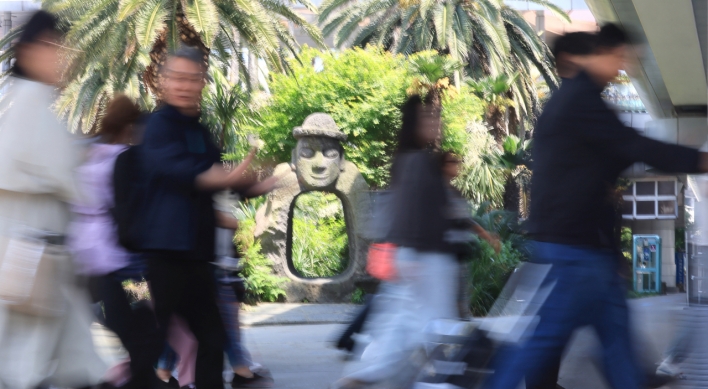Building trust and strength should be focus of N.K. policy: expert
By Korea HeraldPublished : Oct. 14, 2012 - 20:47
Cronin from CNAS cautions against S. Korean military’s complacency
A security expert has advised that the new South Korean president forge a strategic plan for building both “trust and strength” to better deal with North Korea.
In doing so, Seoul should work with the international community so that Pyongyang’s tactics of dividing neighbors no longer work, Patrick Cronin, senior director of the Asia Program at the Center for a New American Security, told The Korea Herald.
The Washington-based think tank provides major policy proposals to the Obama administration. Kurt Campbell, assistant secretary of state for East Asian and Pacific Affairs, co-founded it in 2007.
“We need a two-tiered policy. One is engagement where you are trying to build trust and use information to bring ideas. This is idea-centric and information-centric,” Cronin said, stressing more inter-Korean trust would help glean more intelligence on what is happening in the reclusive state.
“Strength building is (the other) side of the same coin. You can’t separate them. We can’t just go to the Sunshine Policy and forget about the need for pressure and for maintaining strong defense and deterrence.”
Strength building is beyond the passive form of deterrence that has led to North Korea’s fatal attacks and provocations against the South in recent years, he said.
“In the past, we were playing a defense game. We were trying to deter war and North Korea knows it so that they could kill and sink sailors on the Cheonan. We don’t want to go to war and so we do nothing? No! We (should) strengthen our ability,” he said.
“We have to limit the opportunity for North Korea to use lethal force, to commit egregious violations of international agreements. (But) you won’t prevent them. They are very clever, they will find new ways.”
A security expert has advised that the new South Korean president forge a strategic plan for building both “trust and strength” to better deal with North Korea.
In doing so, Seoul should work with the international community so that Pyongyang’s tactics of dividing neighbors no longer work, Patrick Cronin, senior director of the Asia Program at the Center for a New American Security, told The Korea Herald.
The Washington-based think tank provides major policy proposals to the Obama administration. Kurt Campbell, assistant secretary of state for East Asian and Pacific Affairs, co-founded it in 2007.
“We need a two-tiered policy. One is engagement where you are trying to build trust and use information to bring ideas. This is idea-centric and information-centric,” Cronin said, stressing more inter-Korean trust would help glean more intelligence on what is happening in the reclusive state.
“Strength building is (the other) side of the same coin. You can’t separate them. We can’t just go to the Sunshine Policy and forget about the need for pressure and for maintaining strong defense and deterrence.”
Strength building is beyond the passive form of deterrence that has led to North Korea’s fatal attacks and provocations against the South in recent years, he said.
“In the past, we were playing a defense game. We were trying to deter war and North Korea knows it so that they could kill and sink sailors on the Cheonan. We don’t want to go to war and so we do nothing? No! We (should) strengthen our ability,” he said.
“We have to limit the opportunity for North Korea to use lethal force, to commit egregious violations of international agreements. (But) you won’t prevent them. They are very clever, they will find new ways.”

For trust building, Seoul can support agricultural and other nascent North Korean reforms, educational exchanges and training in the finance market, and expansion of inter-Korean projects such as the Gaeseong Industrial Complex, he said.
But Seoul should always seek to lower the “rent” paid directly to Pyongyang to prevent it from being diverted to military purposes, he stressed.
Balancing trust and strength is a challenging task for any democratically elected government as the communist state unexpectedly launches provocations, he noted.
“Even if Pyongyang seems willing to engage the next ROK (Republic of Korea) president, sooner or later it will engage in activity ― a missile test, a third nuclear test, the use of lethal force, cyber attacks, or other provocations ― that will jeopardize engagement,” he said.
“After all, North Korea would prefer to take, not give, and its leadership has reason to be paranoid because its current system and policies are unsustainable.”
Regarding the criticism that Seoul has been inconsistent in its North Korea policy as leaders have had different ideological positions on it, Cronin said it is a “wrong measure” if Seoul bases its policy on consistency.
“We do need a long-term resolution and a long-term plan, but don’t look for consistency. Rather than looking at these as discrete events, it is part of a continuum with an ultimate goal of opening up North Korea,” he said.
Touching on South Korea’s lax border security which has been much criticized after a North Korean soldier recently crossed the border without being caught, he put it down to complacency.
“South Korea is wealthy, has the best technology in the world and surely the cameras (required to do the job). It is complacency. It is not having the process in place. You’ve got the capability, but you are not using it because nobody is being mindful of this,” he said.
Regardless of who takes the helm of each country, Cronin said the allies should make efforts to avoid a policy gap and have a common strategy in dealing with Pyongyang. He noted that the allies could conflict over how to cope with North Korea’s missile threats.
Seoul has long remained reluctant to join Washington’s global missile defense system due to the high cost, the possibility of provoking China and other operational reasons.
“The missile proliferation may be a bigger issue (for the U.S.) than the nuclear. The nuclear issue is eight or potentially 10 (warheads). What does that do? It doesn’t do really much. If weapons systems can reach the U.S., that is serious for the U.S.,” he said.
“South Korea won’t look at missile range in the same way we will be. That is the gap.”
By Song Sang-ho (sshluck@heraldcorp.com)
-
Articles by Korea Herald








![[Weekender] Korean psyche untangled: Musok](http://res.heraldm.com/phpwas/restmb_idxmake.php?idx=644&simg=/content/image/2024/05/02/20240502050841_0.jpg&u=)









![[Eye Interview] 'If you live to 100, you might as well be happy,' says 88-year-old bestselling essayist](http://res.heraldm.com/phpwas/restmb_idxmake.php?idx=652&simg=/content/image/2024/05/03/20240503050674_0.jpg&u=)
